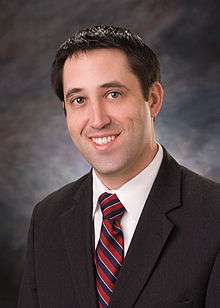Texas Comptroller of Public Accounts
| Comptroller of Public Accounts of Texas | |
|---|---|
| Style | The Honorable |
| Term length | Four years, no term limits |
| Inaugural holder |
James B. Shaw 1846 |
| Formation | Texas Constitution |
| Website | Texas Comptroller's website |
The Texas Comptroller of Public Accounts is an executive branch position created by the Texas Constitution. As with nearly every other executive branch head, the comptroller is popularly elected every four years concurrently with the governor and the other elected executive branch positions (elections take place in even number years not divisible by four; e.g., 2006, 2010, and so on). The current comptroller is Glenn Hegar, who took office on January 2, 2015.
History
The predecessor to the current Comptroller's office started in 1846.
The longest-serving Comptrollers in Texas history were George H. Sheppard, who served for 18 years over nine two-year terms; Robert S. Calvert, who held the post for 26 consecutive years for an unprecedented twelve terms; and Bob Bullock, who served for 16 years for four four-year terms.
Duties currently performed by the Comptroller's office were previously divided between it and the office of Texas State Treasurer; however, over time most of the functions were transferred to the Comptroller's office. Texas voters voted to formally abolish the Treasurer's office in a 1995 constitutional amendment, and by 1996, the Comptroller had taken over the Treasurer's few remaining duties.
Susan Combs was elected in 2006 after the incumbent, Carole Keeton Strayhorn, chose not to run for re-election to a third term.[1] In 2014, Combs did not run for re-election and Glenn Hegar won the general election in November, taking office in January 2, 2015.
Duties
The primary duty of the comptroller's office is to collect substantially all tax revenue owed to the State of Texas. This involves more than 60 different types of taxes from the sales tax (the largest source of the state's tax revenue, since Texas does not have a personal income tax) to minor items such as the "battery sales fee" (a $2–$3 fee on sales of lead-acid batteries). As Texas uses a unified collection system for sales taxes assessed by both state and local governments, the comptroller's office is responsible for collecting and remitting the local portion of this tax revenue to the various cities, counties, and special districts throughout the state.[2]
The comptroller's office also operates the various prepaid college tuition funds operated by the state through its Prepaid Higher Education Tuition Board, provides reports on fiscal management and economic forecasts, and manages the unclaimed property fund.[3]
As part of its fiscal management responsibilities, Article III, Section 49a of the Texas Constitution requires the comptroller to certify to the Texas legislature the amount of available cash on hand and anticipated revenues for the next biennium (the two-year period beginning on September 1 of odd-numbered years). The Legislature is not permitted to appropriate any funds in excess of the comptroller's certified amounts (except in cases of emergency and then only with a four-fifths vote of both chambers), and absent the latter the comptroller is required to reject and return to the legislature any appropriation in violation of this requirement.
List of Texas comptrollers
- James B. Shaw (D): 1846–1857
- Clement R. Johns (D): 1859–1864
- Willis L. Robards (D): 1865
- Albert H. Latimer (R): 1866
- Morgan Hamilton (R): 1867–1869
- Albert A. Bledsoe (R): 1870–1873
- Stephen Heard Darden (D): 1874–1879
- William M. Brown (D): 1880–1882
- William Jesse Swain (D): 1883–1886
- John D. McCall (D): 1887–1894
- Richard W. Finley (D): 1895–1900
- Robert M. Love (D): 1901–1903
- J. W. Stephen (D): 1903–1910
- W. P. Lane (D): 1911–1914
- Henry B. Terrell (D): 1915–1919
- M. L. Wiginton (D): 1920
- Lon A. Smith (D): 1921–1924
- Sam Houston Terrell (D): 1925–1930
- George H. Sheppard (D): 1930–1949
- Robert S. Calvert (D): 1949–1975
- Bob Bullock (D): 1975–1991
- John Sharp (D): 1991–1999
- Carole Keeton Strayhorn (R): 1999–2007
- Susan Combs (R): 2007–2015
- Glenn Hegar (R): 2015–present
References
External links
| ||||||||||||||
| ||||||||||||||||||||||||||||

